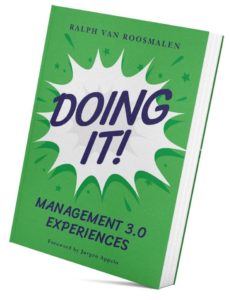by Ralph van Roosmalen
I started my professional career in 1997. I finished the polytechnic university and started my first job as a software developer. I loved it, talking to customers, analyzing their problems and, in the end, creating software to help them solving their problems. If it were up to me, I would be a software developer for the rest of my life. But the idea to manage or work with people? Not for me. Developing software is relatively simple, software does exactly what you tell it to. Assuming you don’t create bugs…
Look at me today. I am a coach and Management 3.0 facilitator. I work with teams and help people grow. And I love it! What happened?
When I graduated, the only approach or method to develop software I knew was Edward Yourdon’s Yourdon Structured Method, which follows a formal structure of feasibility study, essential modeling, and implementation modeling. I realized quickly this was not working for me, way too many steps, way too slow, way too inflexible. I learned about Scrum, and started experimenting with Scrum back in 2004. I really liked the agile approach. It was like coming home. What I realized was that it is all about people in the end. Great people — who have fun in their work and feel engaged — deliver great software.
I already learned that I really liked helping people on my team when I became senior software developer. Becoming a Scrum master was for me a logical next step, as it meant again helping people. I believe a Scrum master should be a facilitator, try to make him or herself absolute. To do realize this, I experimented with practices. As Scrum master I helped people grow on the team, in their profession, and to overall become better professionals.
As Scrum master I realized that working with people was so much fun — hard work sometimes, emotional sometimes, but very rewarding. So I decided to starter a career as a manager. Why? To help people, to make sure other people can do their work. Again it was all about great people, who have fun in their work, feel engaged, and deliver great software. As a manager I experimented with new practices like holding regular 1-2-1 sessions instead of just one end-of-year review. For me, a manager should always be a facilitator, a servant leader. Sometimes, you need to step in and make decisions, but most of the time as manager you should try to make yourself unnecessary.
In 2010 I learned about Management 3.0. When I read the book of Jurgen Appelo, it was again like coming home. As agile was for me the way to go for software development, Management 3.0 was for me the way to go for management. As manager I started experimenting with the ideas and practices described in the book also named Management 3.0 and later in the book #Workout [now called Managing for Happiness]. All the experiments succeeded because I always learned things. Sometimes the outcome was as expected and sometimes it was a positive or negative surprise.
I became self-employed in 2015 and a Management 3.0 facilitator as soon as possible. As Scrum master I wanted to help people, as manager I wanted to help people, and it was clear to me that I wanted other people to learn about Management 3.0 so they could also help people. As a Management 3.0 facilitator, I want to share experiences from when I was a manager, share the ideas and practices of Management 3.0, and help organizations become great places to work.
During my career, I always experimented with new ideas, new practices, new tools. Without experiments I believe you can’t grow — experiments get you out of your comfort zone.

To help other people to apply Management 3.0 practices, I wrote an ebook, Doing It: Management 3.0 Experiences, which illustrates my experiences with experiments related to Management 3.0 and the things I’ve learned.
You can download Doing It: Management 3.0 Experiences for free here.
Challenge yourself, get out of your comfort zone and start experimenting with Management 3.0 practices! They aren’t prescribed formulas but rather starting points for positive change and communication within your organization. Then tell us about your experimentation in the comments below!
Read about some of the dozens of Management 3.0 practices in action:

